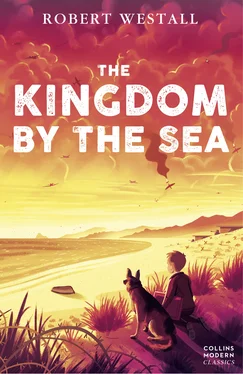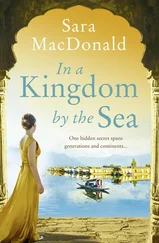Especially, he mustn’t be given to Cousin Elsie. Cousin Elsie, who would clutch his head to her enormous bosom, and sob and call him “poor bairn” and tell everybody who came all about it, over and over and over again. He’d seen her do that when Cousin Tommy died of diphtheria. Cousin Elsie was more awful than death itself.
No, he would go away. Where nobody knew him. Where nobody would make a fuss. Just quietly go away.
Having made his mind up, he felt able to keep moving. There were useful things to do. The blankets in the shelter to bundle up and take with him. The attaché case. All proper, as Mam and Dad would have wanted it.
It seemed to take him a long time to get the blankets bundled up exactly right and as he wanted them.
In the faint light before dawn, he even managed to find Dad’s spade and bury his three rabbits. They had been his friends; he didn’t want anybody finding them and making a meal of them. He even found some wooden seed markers, and wrote the rabbits’ names on them, and stuck them in for tombstones.
Then he went, cutting across the long stretch of gardens and out into Brimble Road, where hardly anybody knew him.
He looked dirty, tear-stained, and exactly like a refugee. His face was so still and empty, nobody, even Cousin Elsie, would have recognised him.
He felt … he felt like a bird flying very high, far from the world and getting further away all the time. Like those gulls who soar on summer thermals and then find they cannot get down to earth again, but must wait till the sun sets, and the land cools, and the terrible strength of the upward thermal releases them to land exhausted. Only he could not imagine ever coming to earth again, ever. Back to where everything was just as it always had been, and you did things without thinking about them.
He supposed he would just walk till he died. It seemed the most sensible thing to do.
He must have wandered round the town all day, in circles. Every so often, he would come to himself, and realise he was in Rudyerd Street, or Nile Street.
But what did Rudyerd Street mean ? What did Nile Street mean ? Sometimes he thought he would go home, and Dulcie would be swinging on the front gate, shouting rude things at the big boys as they passed, but running to the safety of Mam’s kitchen if they made a move to attack her. And Mam would be doing the ironing, or putting the stew in the oven.
But the moment he turned his steps towards home, the truth came back to him; the burning pile of bricks. And he would turn his steps away again.
The last time he came to himself, he was somewhere quite different.
On the beach. The little beach inside the harbour mouth, that didn’t have to be fenced off with barbed wire because it was under the direct protection of the Castle guns.
He suddenly felt very tired and sat down with a thump on the sand, with his back against a black tarry boat. He closed his eyes and laid back his head; the warmth of the sun smoothed out his face, like Mam had often done with her hands. He smelt the tar of the boat and it was a nice smell; it was the first thing he’d smelt since the burning gas, and it was a comforting smell. The sun warmed his hands as they lay on the sand, and his knees under his trousers, and in a very tiny world, it was nice, nice, nice. It felt as if somebody cared about him, and was looking after him.
On the edge of sleep, he said, “Mam?” questioningly. And then he was asleep.
He dreamed it was just a usual day at home, with Dulcie nagging on, and Mam baking, and Dad coming in from work and taking his boots off with a satisfied sigh. He dreamed he shouted at them, “ There you all are! Where have you been ?”
And they all laughed at him, and said, “Hiding, silly!” And it was all right.
The all-rightness stayed with him when he woke; a feeling they were not far away. He lay relaxed; as he remembered lying relaxed in his pram when he was little and watching the leaves of trees blowing, whispering and sunlit overhead. As long as he didn’t move he knew the bubble of happiness would not break. But if he moved, he knew they would go away and leave him again.
So he lay on, dreamily. The sun still shone, though it was setting, and the shadows of the cliff were creeping out towards him. And that he knew was bad. When the shadow reached him the sun would be gone, the world would turn grey, a cold breeze would blow.
And it would be time to go home. Like the three girl bathers who were walking up the beach towards him, chattering and laughing and feebly hitting each other with wet towels. They had a home; he had no home. There was a sort of glass wall between people who had a home and people who hadn’t.
He watched them pass and get into a little black car that was waiting to pick them up. He thought, with a twinge of resentment, that some people could still get petrol for cars even in wartime. Black market. It would serve them right if the police caught them.
Then the car moved off with a puff of blue smoke, and he felt even more lonely. The shadow of the cliff grew nearer. And nearer.
“Please help,” he said to the soft warm air, and the dimming blue sky. “Don’t leave me.” He felt the approach of another night alone as if it was a monster.
The shadow of the cliff was only a yard away now. He reached out his arm and put his hand into it; it felt cold, like putting your hand in water, icy water.
And yet still he hoped, as the shadow crept up his arm.
He closed his eyes and felt the shadow creeping, like the liquid in a thermometer. Only it wasn’t recording heat, it was recording cold.
And then he heard an explosive snort, just in front of him. Sat upright, startled, and opened his eyes.
It was a dog. A dog sitting watching him. A dog who had been in the sea, because its black fur was all spikes. A dog who had been rolling in the sand, because the spikes were all sandy. The dog watched him with what seemed to be very kind eyes. But then most dogs had kind eyes.
The dog held its paw up to him, and hesitantly he took it. The dog woofed twice, softly, approvingly, then took its paw back.
Was this his miracle? He looked round swiftly, for an owner, before he let himself hope.
There was no one else on the beach, just him and the dog.
But lots of dogs came down to the beach on their own and made friends with anybody, for an afternoon. And there was a medal on the dog’s collar.
Not breathing, not daring to hope, he pulled the dog to him by the collar, and read the medal.
The dog was called Don, and lived at 12 Aldergrove Terrace.
Harry shut his eyes, and he couldn’t even have told himself whether he closed them in gladness or horror.
Aldergrove Terrace had been a very posh and very short terrace. Three weeks ago, Aldergrove Terrace had been hit by a full stick of German bombs. Anybody in Aldergrove who was still alive was in hospital … permanently.
He opened his eyes, and looked at his fellow survivor. The dog was a sort of small, short-legged Alsatian. It looked quite fit, but rather thin and uncared-for. It certainly hadn’t been combed in a long time, and people had combed their dogs in Aldergrove every day. It had been that sort of place.
He pulled the dog towards him again, almost roughly. It willingly collapsed against his leg and lay staring out to sea, its mouth open and its tongue gently out. He stroked it. The sandy fur was nearly dry, and he could feel the warmth of its body seeping out damply against his leg.
They stayed that way a long time, a long contented time, just being together. Long ago, they’d had a dog at number nine, but it had got old and died. It was good to have a dog again, and the way the dog delighted in his hand, he knew it was glad to have found somebody as well. He dreamily watched the little waves breaking on the sand; glad he wasn’t alone any more.
Читать дальше












